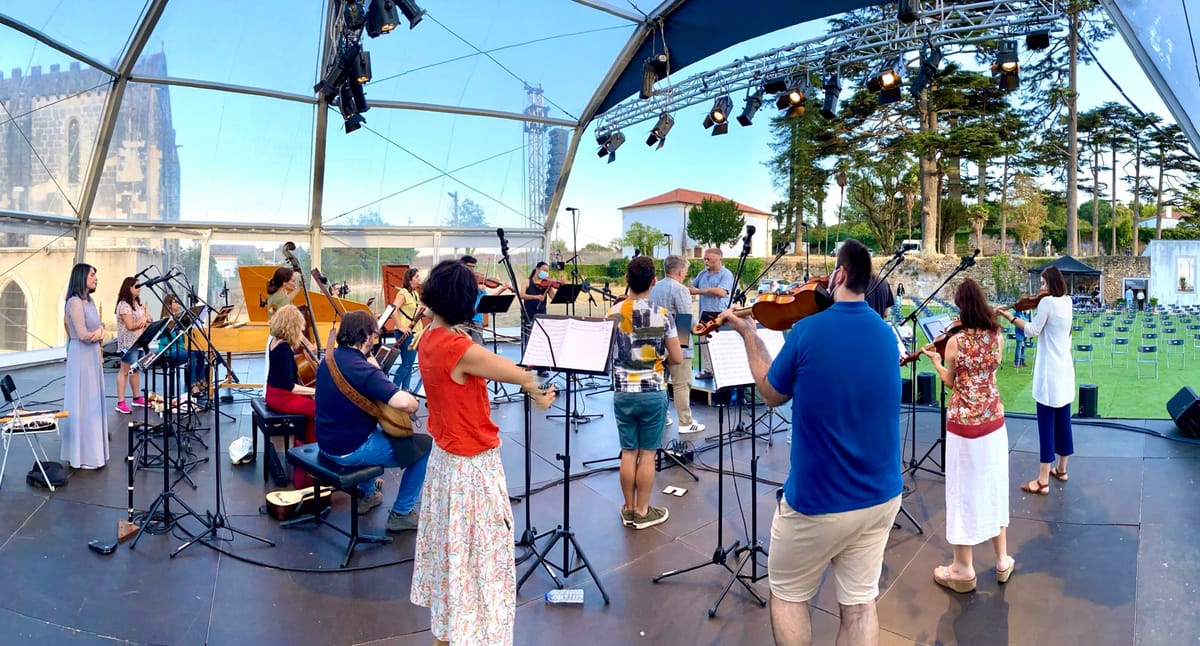Report from Portugal – Music in the Time of Covid-19

Here in Portugal, as most elsewhere, the Coronavirus has had a huge impact on concert-making. Although our “numbers” are relatively moderate, all live concerts have been cancelled since early March, confronting musicians with the heretofore-unknown territory of a “ban” on their principal activity. Orchestras cancelled the rest of their seasons, chamber concerts were cancelled or, more optimistically, rescheduled—and stages across the country were abandoned to emptiness and silence.
While many performers also love to teach and have been able to continue using online technology, what keeps our souls alive is performing—a means of sharing the best of humanity, our ephemeral art, person to person.
Though watching or recording YouTube videos can be enjoyable, it is not the same as being in the same room or hall with the audience. Performance is a mutual act, a two-way street. We offer, and you may accept, you may respond, we are inspired, our inspiration inspires you; an intimate circle is formed. Mankind rises a tiny bit nearer to its potential.
So it was with immense anticipation that our early-music ensemble La Nave Va, under the direction of António Carrilho, prepared, in fits and spurts, for a live performance in the CisterMúsica Festival in Alcobaça. This is a long-running festival of classical music, held in the breathtakingly beautiful Monastery of Alcobaça (about one hour North of Lisbon), which has several perfect rooms for concerts. As the Covid numbers in Portugal rose and fell, cycling, the chances of the concert (and the Festival) taking place cycled up and down as well. As Director of La Nave Va—as well as soloist, conductor, programmer, and arranger—Carrilho spent months on tenterhooks, waiting for definitive confirmation of the concert. It was postponed a time or two, the number of performers was limited to allow distancing onstage, the venue moved outdoors…the repertoire adjusted and re-adjusted. Finally, a mere two weeks before the concert date, firm confirmation was received: a go-ahead for the entire Festival, announced as “Live Music, in Safety”.
https://www.instagram.com/p/CDbx5i8qc5N/
This never could have been possible without the many adjustments adroitly conceived by the presenters and technicians from CisterMúsica, so our hats go off to them! Firstly, the gorgeous indoor spaces had to be abandoned for an outdoor venue alongside the monastery’s walls. A stage was built, a “tent” of clear plastic (with an appearance somewhere between a bubble and a spaceship) set upon the stage, to protect from wind and prevent the complete dispersion of sound. Tthe recording crew set up individual mics for amplification of the gentle-sounding period instruments, to avoid capturing criss-crossing echoes from inside the “bubble”. Some 52 individual tracks were then meticulously mixed to find a natural-sounding balance—no easy task! The musicians were necessarily spaced quite far apart onstage, for hygienic reasons that could not be dismissed, even if not ideal for ensemble playing. Lighting technicians were also essential, as the concert started at 9:30pm, when the heat and bright sunlight of the day had dissipated. They not only illuminated the stage, but provided colourful, atmospheric lighting for added visuals.
Last but not least, the seating for the audience was also undertaken with extreme care: staggered rows of folding chairs about 1.5 meters apart, set out rather beautifully on the green lawn. Attendees were required to wear masks, but there is no other way in the current situation.
https://www.facebook.com/festivalcistermusica/photos/a.3699209410108837/3699207703442341
The adjustments for the performers were manifold: the choice of repertoire, adjustments of instrumentation—which ended up being spectacular, including two harpsichords, a theorbo or baroque guitar, and an oboe da caccia, along with a small but mighty string section and four other wind instruments. This served to fill out the sound in the outdoor environment, and provided an unusually extensive palette of instrumental colours. In rehearsals in Lisbon, musicians were spread out in the room, all except wind players using a mask. Everyone took it in stride because the desire to perform was overwhelming!
The program included a luxurious abundance of soloists: firstly, the renowned Dutch tenor Marcel Beekman, who last season sang brilliantly in Carrilho’s concert version of Purcell’s “Fairy Queen” in Lisbon. The concert was titled “Bravura Arias” and no form of bravura singing was left unexplored: the obvious coloratura, dramatic expression, leaps, and dynamic shadings, but also the most tender and heartbreaking expressions, such as in Vivaldi’s Gelido in ogni vena (“Like ice in every vein”) from the opera Farnace. It is always an honor to share the stage with such a phenomenal artist as Beekman—invariably inspired and moving without a whit of “diva” attitude. Further arias by Handel, Rameau, and Mozart adorned the program like jewels.
https://www.facebook.com/festivalcistermusica/photos/a.3699209410108837/3699207183442393
Carrilho also performed as soloist in the Concerto in E Minor for Recorder by G. B. Ferrandini, a wonderfully imaginative and energetic Italian concerto by a composer I recommend to all readers for further listening. As usual, while also conducting, Carrilho extracted from the “simple” recorder more beauty and surprises than one could ask even of a violin or cello. Like Beekman, he is musical mastery personified.
https://www.facebook.com/festivalcistermusica/photos/a.3699209410108837/3699206840109094
And as if all that were not enough, Carrilho had arranged a Fandango, originally for solo harpsichord, by Padre António Soler (Spain) for two concertante soloists, himself, and the excellent violinist Raquel Cravinho, plus two harpsichords and the full ensemble. This Fandango has the hypnotic spirit of an 18th-Century prequel to Ravel’s “Bolero”, more rustic yet just as wild, and was executed enthusiastically by the soloists, and harpsichordists Diego Fernández Rodríguez and Jenny Silvestre, with La Nave Va led by the wonderful Dutch violinist Pieter Affourtit.
With the evening swinging gracefully from one aspect of the 18th Century aesthetic to another to another in the most natural and fluid and entertaining way, Carrilho showed his enormous gift as a programmer. The audience went wild, and after many returns to the stage, a bis (encore) was performed to close the very special concert.
https://www.facebook.com/festivalcistermusica/photos/a.3699209410108837/3699208700108908
All were overjoyed that the concert sold out, justifying so much work. Furthermore, interviews with Carrilho and Beekman and clips from the rehearsal were featured in the national TV news the following day—precisely because this concert showed the power of imagination, persistence, and flexibility to overcome a most vexing obstacle. In Portuguese, there is a word for this culture of embracing the willingness to improvise, to find a solution, to make things happen: desenrascar (“dez-en-rash-KAR”). Let’s all learn that word, it’s going to be very, very useful!





